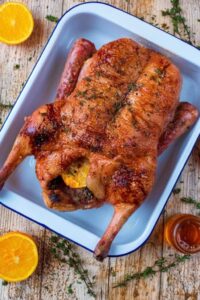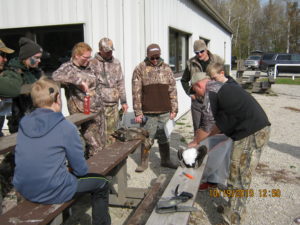Tasty Waterfowl Dishes Filling Way To Entice New Hunters
An article from WWA’s Words From The Wardens.
This article originally appeared in Wisconsin Waterfowl Association’s November, 2022 eNewsletter.
 By DNR Conservation Warden Tim Otto, Rhinelander – timothy.otto@wisconsin.gov
By DNR Conservation Warden Tim Otto, Rhinelander – timothy.otto@wisconsin.gov
Earlier this year, I told you about the rewarding and fun class where we teach interested hunters how to hunt upland birds in Rhinelander.
I am a waterfowl hunter, and I am fascinated by hunting with my American water spaniels. One of my passions is sharing my love for waterfowl hunting with my students.
Since we’re headed into the holiday season and we’re in the mood for tasty, hot food, I thought I’d share some cooking tips I discuss with students. After all, that’s the purpose of this hunter program – harvest your food, then enjoy the meal.
Wild Game Meal May Serve Up a New Hunter
Many new hunters begin their new hobby because they want to learn to harvest healthy and environmentally friendly meat. An opportunity to get someone new interested happens every time you serve wild game to non-hunters, whether in class, at a family gathering or a campfire. People are seeking healthy alternatives to acquire food and stay on budget. Hunting provides a wonderful opportunity to do just that.
When talking about wild game, there is often a reference to a “gamey taste” that many do not like. It helps when they’re reminded that this is a unique experience – the price for wild game would be exorbitant if it were sold based on the expenses incurred during the sport. And let’s not forget the distinctiveness of that experience based on what the animal ate in the wild.
Ducks Are a Delicacy
To get the best flavor and quality, look at your waterfowl as the delicacy they are – and not a burden to be hastily butchered with a rusty knife. Getting a bag limit of ducks requires hours of scouting, shotgun practice, expensive equipment and rising hours before the sun. I’m always surprised at how people treat their hard-gotten game after all their effort. Throwing a shot duck into the bottom of a boat to marinade in a mixture of spilled fuel and muck and tenderized by a wader boot is quite the opposite of how they should be handled.
The wound channels from pellets and Fido’s teeth are an avenue to introduce foreign substances, including bacteria, into the meat. Instead, consider handling the bird appropriately for the weather, disemboweling it, or allowing it to cool in the air and out of the sun.
 It’s Better with Bacon: Not For Wild Game
It’s Better with Bacon: Not For Wild Game
Consider how you handle and process your game compared to professionals. Experienced chefs don’t soak the meat in a bowl of water before cooking. I’ve never seen my local butcher wash off a T-bone before wrapping it. Both take great pains to avoid getting the meat dirty, so it doesn’t have to be washed and dried. Keeping your hands clean and dry during butchering will avoid getting feathers stuck to the meat, preventing excess washing and soaking. Preparing the meat fresh, void of cycles of freezing and thawing, will keep moisture in the meat and avoid damaging its protein fibers.
There are great recipes for wild game available in cookbooks and online. As I look through many, I’ve become aware that most have one ingredient absent that the average duck hunter and cook uses to excess – bacon.
When referring to duck, a common refrain from duck hunting cooks is, “It tastes good wrapped in bacon.” I find that bacon masks the flavor. Consider broadening your culinary skills and avoid making your fare taste like domestic pork.
Why do so many hunters do this? Wild game lacks fat, and bacon offsets this. There are better ways to counteract the leanness of the meat.
Most red meat wild game, like ducks, are best served on the rare side to avoid drying and to keep the meat tender. Using fruit or a sweet sauce will give the meat an amazing flavor. To add a little flare, consider using fruits you’ve foraged from the wild, like currants, blueberries or blackberries, or something from your home orchard, like cherries. Skipping the bacon will open a wide array of recipes and can be done relatively simply while imparting a wider array of flavors.
Another consideration when cooking duck is that their skin and fat are very flavorful on their own. Plucking birds preserves the skin, protecting the meat from direct heat and allowing the fat to render and soak into the meat.
Depending on the bird’s condition, I’ll either pluck the entire bird using hot water and wax or will pluck the breast only. There are several videos online on wet plucking with wax melted in a pot of hot water, which is how I learned. This produces a beautifully plucked bird that’s ready for a smoker or to be oven-roasted.
To pluck the breast only, I hand pluck to the best of my ability. Then, I fillet the breast as a single piece, taking great care to keep the skin intact over the breast keel bone. Once this piece is removed, I use a small hand torch to singe any small feathers. When cooking the breast, the skin will recede and potentially expose the meat to direct heat. Keeping the meat covered with skin will keep it moist and add a desirable flavor to the pallet.
 Serve Up Engaging Dinner Conversations
Serve Up Engaging Dinner Conversations
Plucking the whole bird allows me to get more meals out of it. I like to smoke my plucked birds. Then, I only eat the breast at the first sitting. The rest of the smoked duck is then fantastic added to a stew or soup. I use two or three mallards to make a single recipe. I mix the meat with wild rice harvested from the same place I harvested the ducks, making for a meal and experience I’m proud to share with dinner guests. Wild, foraged vegetables, mushrooms and vegetables from your garden increase the local food aspect that many enjoy.
If I only pluck the breasts, I still utilize the legs and wings. These go into a bag in my freezer labeled “stew meat” for later.
In your pursuit of encouraging more people to give waterfowl hunting a try, consider the role food plays in motivating people to get into the marsh. Post pictures of your wild game in a cast iron pan as often as you share grip ‘n grins on social media. Non-hunters are unimpressed by a pile of mallards on a tailgate but can appreciate the presentation of delicious duck garnished with a sprig of garden-grown thyme paired with a homemade spirit. It also generates an engaging conversation on why we rise and shine in the small hours to sit in a freezing marsh or wind-whipped field.

